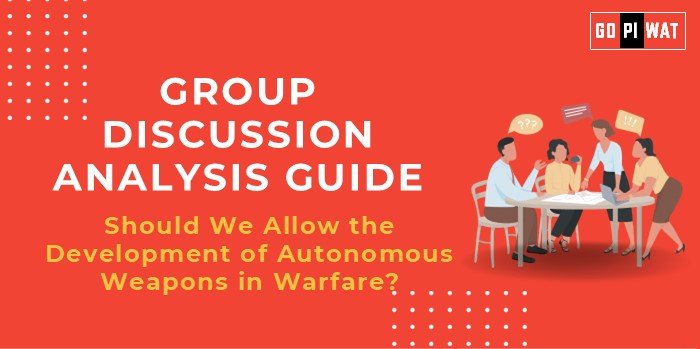📋 Group Discussion Analysis: Should We Allow the Development of Autonomous Weapons in Warfare?
🌐 Introduction to the Topic
Opening Context:
“The development of autonomous weapons—systems capable of making decisions without human intervention—raises profound ethical, legal, and strategic questions in modern warfare. Their potential to reshape military conflicts is as enticing as it is concerning, particularly in an age of rapid technological advancement.”
Topic Background:
Autonomous weapons, also known as lethal autonomous weapon systems (LAWS), leverage AI and robotics to identify, target, and engage threats. While their development promises precision and reduced casualties among soldiers, critics highlight the ethical dilemmas of relinquishing life-and-death decisions to machines. The ongoing global debate has intensified with advancements in AI and robotics, particularly as nations like the U.S., China, and Russia make significant strides in this area.
📊 Quick Facts and Key Statistics
- 🌍 Nations Developing AI Weapons: Over 30 countries are actively researching autonomous military systems.
- 💰 Global Defense Spending on AI: $7.5 billion (2023), reflecting rapid growth.
- ⚠️ Civilian Risks: UN reports suggest a potential 30% increase in collateral damage when autonomous weapons are poorly regulated.
- 📊 Public Opinion: 61% of surveyed global citizens oppose the use of killer robots (Human Rights Watch, 2023).
🤝 Stakeholders and Their Roles
- 👨💼 Governments and Militaries: Drive the research, funding, and deployment of autonomous systems for strategic superiority.
- 🌍 International Bodies (UN, ICC): Advocate for regulations, ethical use, and global consensus on deployment.
- 💻 Technology Companies: Innovate and produce the required AI systems while balancing ethical considerations.
- 🤝 Civil Society Groups: Highlight the potential human rights violations and ethical dilemmas posed by autonomous weapons.
🏆 Achievements and Challenges
🌟 Achievements
- ✅ Reduced Soldier Casualties: Autonomous weapons can operate in high-risk zones, minimizing human exposure.
- 🎯 Enhanced Precision: AI-driven targeting systems aim to reduce unintended damage.
- ⚙️ Operational Efficiency: Increased speed and scalability of military operations.
⚠️ Challenges
- 🛑 Ethical Concerns: Delegating life-and-death decisions to machines undermines human moral judgment.
- ⚔️ Global Arms Race: Autonomous weapons could trigger an unregulated AI arms race.
- ❓ Accountability Issues: Determining responsibility for wrongful deaths caused by autonomous systems.
🌍 Global Comparisons
- 🇮🇱 Success in Israel: The Harpy drone system successfully operates semi-autonomously.
- 🇱🇾 Risks in Libya: Reports of AI-controlled drones acting without human authorization underline the dangers of weak oversight.
💬 Structured Arguments for Discussion
- ✅ Supporting Stance: “Autonomous weapons enhance precision and reduce the risk to human soldiers in combat zones.”
- ❌ Opposing Stance: “The delegation of life-and-death decisions to AI raises profound ethical dilemmas and accountability concerns.”
- ⚖️ Balanced Perspective: “While autonomous weapons promise operational efficiency, their use must be regulated to address ethical and safety concerns.”
🛠️ Effective Discussion Approaches
- 📊 Statistical Impact: “With $7.5 billion spent on autonomous defense systems in 2023, the world stands at a crossroads between innovation and ethics.”
- 🤖 Contrast Approach: “While AI promises precision in warfare, it also risks dehumanizing combat decisions.”
- 🔄 Counter-Argument Handling: If criticized for accountability, argue for human oversight protocols as a regulatory solution.
📈 Strategic Analysis of Strengths and Weaknesses
- 💪 Strengths: Precision, reduced soldier casualties.
- ⚠️ Weaknesses: Accountability gaps, ethical dilemmas.
- 🌟 Opportunities: Enhanced deterrence, reduced costs.
- ⚔️ Threats: Global AI arms race, potential misuse by rogue states.
🎓 Connecting with B-School Applications
- 📘 Real-World Applications: Explore AI ethics in decision-making or its implications in business risk management.
- 🧠 Sample Interview Questions:
- 💡 “How should companies balance innovation with ethical concerns in AI development?”
- 💡 “What lessons can the corporate world learn from the regulation of autonomous weapons?”
- 📖 Insights for Students: Understand how decision-making frameworks can apply to controversial technologies.


